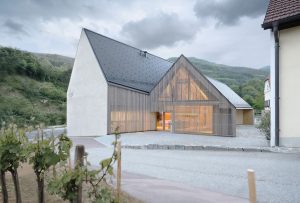Senate adopts concrete measures for the next ten years and sets new CO2-targets for 2030 and 2050
December 3, 2019. Today, the Senate has set two decisive courses to achieve Hamburg's climate goals with an update of its climate plan and a new climate protection law. CO2 emissions are to fall by 55 percent by 2030, and Hamburg is to become climate-neutral by 2050. The climate plan describes the responsibility and the respective CO2 reduction targets in the sectors "transport", "private households", "trade, services, commerce" and "industry". It contains a large number of concrete measures which are to lead to the necessary reduction of CO2 emissions by 2030. The draft of the new climate protection law creates a binding legal framework for this.
Mayor Peter TschentscherHamburg has achieved a lot in climate protection since 2011. We are refurbishing schools and public buildings, relying on emission-free public transport, investing in onshore electricity in the port and phasing out coal for district heating. Since 2012, CO2 emissions in Hamburg have been reduced every year, on average by over 400,000 tonnes of CO2 per year. With the measures now adopted, we will certainly achieve the 55 percent climate protection target for 2030, and probably even exceed it. As a modern metropolis and major industrial location in Germany, Hamburg is thus making an important contribution to compliance with the Paris Climate Agreement."
Environment Senator Jens Kerstan: "Climate protection is not an end in itself. Hamburg must do everything it can to protect people from the consequences of climate change. With the climate plan, we are showing a way in which Hamburg can achieve its goals in concrete terms and live up to its responsibility. We have tightened up the interim target and want to reduce CO2 emissions by 55 percent by 2030. Hamburg is to become climate-neutral by 2050 at the latest. There is a long way to go until then and the challenges are great. But we are now moving forward and have adopted a large number of concrete measures in the Climate Plan. The Senate will invest billions. In addition to investment, funding and innovation, we also need new rules and obligations in some areas so that we can move faster to achieve our goals. We are therefore presenting Germany's most ambitious and far-reaching climate protection law, and in doing so we are also breaking new legal ground in some areas. Some regulations will demand contributions from individuals, but we don't want to overburden anyone. That is why we will ensure that the burden is shared in a fair and socially balanced way. But climate protection also offers opportunities: if we take up the challenge with determination, the change in transport, the change in heating and the necessary modernisation of buildings, power plants and industry can become a job engine and innovation driver for Hamburg. The Climate Plan and the Climate Act do not yet solve all the problems. But they are a big step forward and a good foundation on which further climate protection efforts can be built in the future."
Reduction target and binding controlling
By 2030, Hamburg will reduce CO2 emissions by 55 percent compared to the base year 1990, and by 2050, the city aims to reduce emissions by at least 95 percent in order to achieve climate neutrality.
Hamburg's CO2 emissions amounted to around 20.7 million tonnes in 1990 and are to be reduced to 9.3 million tonnes by 2030. Since CO2 emissions were already reduced by 20.8 percent (around 16.4 million tonnes) by 2017, the new reduction target requires a further reduction of around 7 million tonnes by 2030.
In order for Hamburg to achieve its reduction targets, a fundamental course must be set for climate protection at the federal level as well. Among other things, the expansion path for renewable energies and the phase-out of coal are of decisive importance. The biggest adjustment screw for which Hamburg is responsible is the expansion and qualitative improvement of the district heating supply with the aim of complete decarbonisation in the medium term. Important cornerstones for this are the shutdown and climate-friendly replacement of the Wedel power plant and the climate-friendly conversion of the Tiefstack power plant.
According to current calculations, taking into account the potentials in the federal electricity mix and district heating (savings through energy mix), a difference of about 4.1 million t CO2 remains, which must be reduced through a mix of further independent Hamburg measures.
The Climate Plan sets out the reduction commitments in relation to the sectors: The 2019 Climate Plan builds on the predecessor plan of 2015. It differentiates between four major areas of CO2 emitters, the sectors Private households (PHH), Commercial-Trading-Services (GHD), Industry and Traffic. A fifth major area is the Climate adaptation. Specific savings targets in percent and tons are specified for the sectors.
The PHH sector (including buildings) is to reduce emissions by a further almost 2 million tonnes of CO2 by 2030, the tertiary sector by 2.1 million tonnes, industry by 1.6 million tonnes and transport by around 1.4 million tonnes (in each case based on 2017).
The responsibility for compliance lies with the competent authorities themselves. The coordination for the climate plan lies with the environmental authority. The implementation and success of the measures are reviewed annually, every two years a report is submitted to the citizens and at the latest every four years the climate plan is adjusted.
Climate Plan
With the Climate Plan, Hamburg is taking on the task of introducing the necessary measures in the coming years so that its citizens can continue to live in a liveable, economically successful and affordable city that, as a major metropolis, makes its contribution to coping with climate change.
The plan is linked to a number of measures such as renovation and decarbonisation roadmaps, energy standards for buildings, expansion measures for local public transport and cycling as well as funding for climate protection projects and on-site advice for companies. (See below for a list of selected measures)
The measures to implement the Climate Plan require considerable financial resources. According to the current state of planning, which of course cannot yet be estimated, a total volume of around 2 billion euros is assumed for the duration of the Climate Plan up to 2030.
A significant proportion of the projects in the various sectors are already the subject of ongoing planning by the respective authorities or public companies (e.g. the expansion of local public transport) and therefore do not need to be budgeted separately. A significant proportion of the projects are also the subject of financing plans by private partners or stakeholders, particularly from business and industry, so that they do not trigger any or only a proportionate financing or funding requirement for the Free and Hanseatic City of Hamburg. Furthermore, additional funds are required from the federal government for the federal states and municipalities in order to meet the enormous challenges of climate protection financially.
The remaining additional financial requirements will be specified and raised for the 2020 financial year in a supplementary appropriation bill and for the financial years from 2021 onwards in the context of the respective budget preparations. Appropriate reserves have already been provided for in the budget for the starting year 2020.
Climate Protection Act
With the draft of the Climate Protection Act, the Hamburg Senate intends to anchor the limitation of global warming as a state objective in the Hamburg State Constitution. The draft comprises 31 paragraphs and, following today's decision by the Senate, will go to the Hamburg Parliament for further discussion. The constitutional amendment requires a two-thirds majority in the Bürgerschaft.
The objectives of the climate plan are anchored in law. The same applies to the procedure for regular revision and adaptation. In addition, a number of substantive provisions are also made:
It provides, inter alia, for Obligation to install solar systems from 2023 on Hamburg's roofs (in new buildings) and a compulsory Share of renewable energies when heating systems are replaced from mid-2021. Oil heating systems in new buildings will no longer be permitted from 2022, and the replacement of existing systems with heating oil will be prohibited from 2026. There will be exemptions for all these requirements in order to prevent unreasonable hardship in individual cases. A scientifically staffed Climate Council be installed to advise the Senate. Public buildings are to be built and refurbished in an exemplary energy-efficient manner. The State Administration and its vehicle fleet are to be climate-neutral be organized. In addition, the law defines goals for a sustainable and low-emission mobility.
Selection of measures from the climate plan
Heat supply:
- Decarbonisation of district heating (replacement Wedel, conversion Tiefstack)
- New heating networks using renewable energies and waste heat for new and existing areas
- Creation of incentives for the use of hybrid heat supply systems
- Further development of energetic neighbourhood approaches
Building efficiency:
- Further development of support programmes for the energy-efficient refurbishment of residential and non-residential buildings
- Feasibility study on Hamburg's housing stock to identify potential and draw up a roadmap for achieving climate targets in the building sector
- Energy refurbishment of public non-residential buildings
- New buildings and extensions to public non-residential buildings will be built to at least the Efficiency House 40 standard from 2022 onwards.
- Development of a Hamburg timber construction strategy
Mobility:
- Expansion of public transport through new construction of U5, S32, S4, extension of S21, U4, densification through additional stops; introduction of an express bus and neighbourhood bus network
- Linking of classic public mobility, sharing and on-demand services, expansion of digital information and distribution systems, further expansion of mobility hubs (switchh points)
- Implementation of the cycle route concept, planning and construction of cycle paths
- Support programme for cargo bikes and programme for public bicycle parking spaces
- Incentive to change modes of transport through car-free inner city zones
- Drive forward the expansion and operation of publicly accessible charging infrastructure for e-vehicles, also on commercial and private sites
- Complete conversion of car sharing fleets to e-vehicles according to EmoG
- Development and implementation of an overall urban concept for the last mile
- Expansion of shore-side power for container ships, shore-side power for cruise ships at HafenCity and Steinwerder terminals
- Emission-free Alster shipping
- Increasing the number of e-cars in the FHH fleet and in public companies
Economy:
- North German real laboratory - testing the holistic transformation of the energy system in order to demonstrate ways to achieve rapid decarbonisation
- Climate protection sub-concepts for large commercial/industrial sites, employment of climate protection managers
- Networks (energy efficiency networks, public enterprises as climate partners)
- Further development of the funding concepts, inter alia with regard to sector coupling
- Promotion of CO2-efficient use of materials in production processes.
Adaptation to climate change:
- Heavy rainfall prevention and near-natural rainwater management: Retain rainwater, use it and return it to the natural water cycle.
- Heat prevention: green in the city, networking of green spaces, preservation and development of the tree population, green roofs and facades.
- Continue coastal and inland flood protection.
- Ensure security of supply in critical infrastructures: energy, drinking water, waste water and communications.
- Developing civil protection: Disaster and Health Protection.
Links
www.hamburg.de/klimaplan
www.zeit.de/...klimaplan-hamburg...
Keywords:
100% EEs, Greening / climate adaptation, Procurement, Stock, Bike-/Velo-City, CO2-neutral, DE-News, Renewable, Climate protection, Communities, Mobility, Sustainable management, News Blog Hamburg, PV, PlusEnergy house/settlement, Quarters, Resource efficiency, Settlements, Solar thermal, City, Sufficiency, Environmental policy, Housing, Housing policy, Thermal insulation, eMobility, Life cycle assessment, Ecology





